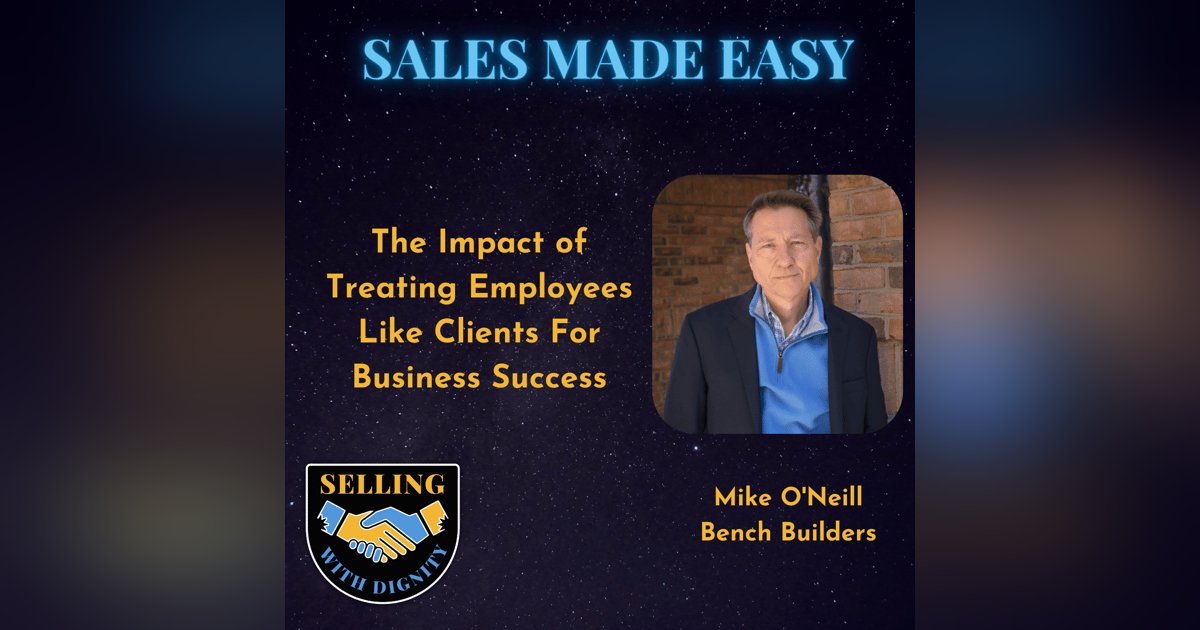
Sign up to get updates from us
By signing up, you agree to receive email from this podcast.

TSummary/Abstract
Harry Spaight and Mike O'Neill are catching up on how Mike's business is doing. Mike is pleased that people he has been speaking with have come back and want to figure out how to work together. Harry then asks Mike about the relationship building he does in his business. Mike explains that he has spent over 20 years in corporate HR, working for a small company that eventually became a Fortune 500 company and leading a large HR team. For the last 10 years, Mike has taken his HR expertise to help small to mid-sized businesses grow.
Harry Spaight is talking to an expert in HR and people management, who is helping businesses with their people problems. The expert explains that they offer both training and coaching services in order to help businesses improve their people skills. On the training side, they focus on making sure that supervisors and leaders are comfortable in their roles and are able to treat their employees in a way that gives them a sense of value. For coaching, they work with individuals and teams on very specific behaviors to help them improve their performance. People problems can be a major hindrance to businesses, but the expert is helping people to identify and address those issues in order to ensure that their business can continue to prosper.
Mike O'Neill is a business owner who helps companies with people-related challenges. He views HR as a profession that requires credibility and the ability to sell services to internal customers. O'Neill believes that the key to gaining trust with decision makers is to show that he is there to support them, not to threaten them. He starts with the HR department to build trust and demonstrate his ability to help them be more successful. He then looks to understand the challenges they are wrestling with most, and helps them find a solution if he can't provide it himself.
The conversation between the two people focuses on the importance of HR departments when hiring new employees. It is suggested that when talking to business owners, the conversation should be more bottom line-oriented and focus on how the potential employee can benefit the bottom line. It is argued that more emphasis needs to be placed on keeping existing employees, as supervisors are often seen as representatives of the company. The conversation then moves to the average longevity of employees, with it being suggested that turnover is a major issue, and that there should be a target for employees to stay for a certain period of time.
Timestamps
00:00:02
Conversation between Harry Spaight and Mike O'Neill on Building Relationships and Growing Businesses
00:03:46
Heading: Helping Businesses Overcome People Problems Through Training and Coaching
00:04:46
Heading: Establishing Trust and Building Rapport in Business Relationships
00:10:39
Conversation on Employee Retention and Engagement
00:11:05
Heading: Baby Boomer Loyalty in the Workplace: A Discussion with Mike O'Neill
00:13:21
Conversation on Employee Retention and Client Churn
00:16:48
Conversation on Treating Employees Like Clients and Selling with Dignity
00:18:25
Exploring Effective Sales Management Strategies
00:23:42
Conversation on Collaboration and Adapting to Circumstances in the Workplace
00:26:57
Conversation on Leadership and Emotional Intelligence
00:28:43
Conversation on Emotional Intelligence and Leadership Success
_:__:__
Reflection on Business Ownership and Coaching: A Conversation with Harry
00:36:04
Conversation Summary: Boldness in Corporate Sales
00:37:36
Interview with Mike O'Neill: Exploring Vulnerability, Awareness, and Emotional Intelligence in Business and Personal Life
Highlights
But it's not unusual that the things they want to work on is the GANUS greater sense of getting the right things done and to be more purposeful in life and to make a difference in the life of others.
Usually the conversation is, Mike, I want to improve my effectiveness as a leader. I want to improve the effectiveness of our organization. I'm looking for ways to do that.
This emotional intelligence, Mike, is this something that most executives are thinking about? Or is this kind of like, oh yeah, I should be thinking about it. Is there, is it kind of a wake up when they're having conversations with you on this?.
There's a term battered around called emotional intelligence, and I think it's largely misunderstood, But what I would say is the people who are viewed as having high emotional intelligence are people who have the ability to do what is it we're describing.
Yeah, you know, Harry, I mentioned earlier, I look to you as having sales expertise and that is working with a sales organization and sales leaders. I don't characterize myself with that expertise, but what I have found, working with sales leaders, the topics that we're talking about are not unique to sales leaders.
Thank you for checking out the Sales Made Easy podcast brought to you by Selling With Dignity.
I'm your host Harry Spaight and bring to you some 25+ years of sales and sales leadership experience in the hyper-competitive arena of office technology sales. I will be chatting with business owners and sales leaders that share their insights about growing their businesses and topics that will be of value. I will sprinkle in a little humor where we can fit it in because life is too short not to have a few laughs along the way.
Look for me on LinkedIn at https://www.linkedin.com/in/harryspaight/ and you can download a few chapters of Selling With Dignity here: https://sellingwithdignity.com/the-book/